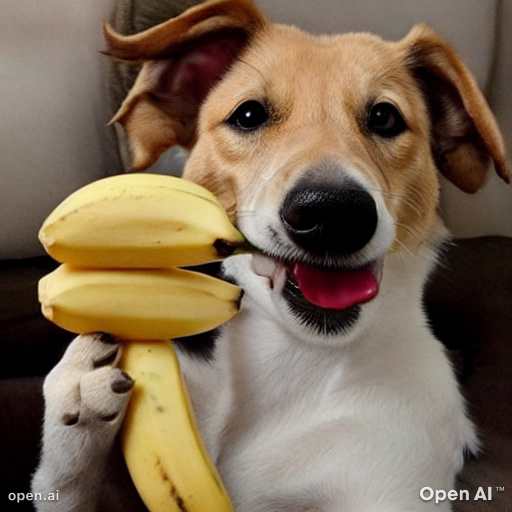Are Dogs Allowed To Have Bananas? Bananas are a popular and nutritious fruit enjoyed by many humans. They are not only delicious but also provide several health benefits due to their rich content of vitamins, minerals, and fiber. As a dog owner, you may wonder if it is safe to share this tasty treat with your furry friend. In this article, we will explore whether dogs are allowed to have bananas and discuss the potential benefits and risks associated with feeding bananas to dogs.
Table of Contents
The Nutritional Value of Bananas
Before delving into the question are dogs allowed to eat bananas, it’s important to understand the nutritional value of this fruit. Bananas are low in calories but packed with essential nutrients that promote good health. They are an excellent source of potassium, vitamin C, vitamin B6, dietary fiber, magnesium, and antioxidants.
Potassium: Bananas are rich in potassium, a mineral that plays a vital role in maintaining proper heart and muscle function in dogs. It helps regulate blood pressure, supports nerve function, and aids in the conversion of food into energy.
Vitamin C: This powerful antioxidant helps boost the immune system, protecting dogs from illnesses and promoting their overall health. It also plays a role in collagen production, which is essential for healthy skin and coat.
Vitamin B6: Bananas contain vitamin B6, which supports brain development, helps with the production of red blood cells, and promotes a healthy nervous system in dogs.
Dietary Fiber: The dietary fiber found in bananas helps maintain a healthy digestive system in dogs. It aids in bowel movement regulation and prevents constipation, promoting overall gastrointestinal health.
Magnesium: Bananas are a good source of magnesium, an essential mineral that supports various bodily functions in dogs. It helps maintain muscle and nerve function, regulates blood sugar levels, and promotes bone health.
Antioxidants: Bananas contain antioxidants like dopamine and vitamin C, which protect your dog’s cells from oxidative stress and contribute to their overall well-being.
Can Dogs Eat Bananas?
The good news is that bananas can be a healthy addition to your dog’s diet when fed in moderation. In fact, many pet owners and veterinarians consider bananas to be a safe and nutritious treat for dogs. However, it’s crucial to follow certain guidelines to ensure your dog’s well-being.
Moderation is Key
While bananas are generally safe for dogs, it is important to remember that moderation is key. Dogs have different dietary needs, and feeding them excessive amounts of bananas can lead to digestive issues such as diarrhea or upset stomach. Therefore, it is recommended to introduce bananas gradually into your dog’s diet and monitor their response.
Serving Size
When offering bananas to your dog, it’s important to consider their size and individual nutritional needs. As a general guideline, small to medium-sized dogs can be given half a banana as an occasional treat, while larger dogs can have a whole banana. However, always consult with your veterinarian to determine the appropriate serving size based on your dog’s specific requirements.
Preparation and Feeding Methods
Before feeding bananas to your dog, make sure to remove the peel entirely. Banana peels are not digestible for dogs and can cause gastrointestinal blockages. Additionally, it is best to slice the banana into small, bite-sized pieces to prevent choking hazards. You can serve the banana slices as a standalone treat or incorporate them into your dog’s regular meals or homemade dog treats.
Including bananas in your dog’s diet can provide various health benefits. Let’s explore some of the potential advantages associated with feeding bananas to dogs:

Health Benefits of Bananas for Dogs
1. Vitamin and Mineral Boost
Bananas are a great source of essential nutrients such as potassium and vitamin C. Potassium plays a vital role in maintaining proper heart and muscle function, while vitamin C supports the immune system and promotes healthy skin and coat in dogs.
2. Digestive Health
Bananas contain dietary fiber, which aids in maintaining a healthy digestive system for dogs. Fiber helps regulate bowel movements, preventing constipation and promoting overall gastrointestinal health.
3. Energy Boost
The natural sugars present in bananas can provide a quick energy boost for your furry companion. This can be particularly beneficial during long walks, training sessions, or any physically demanding activities.
4. Electrolyte Balance
Due to their high potassium content, bananas can help maintain a healthy balance of electrolytes in your dog’s body. Electrolytes are essential for proper nerve and muscle function, hydration, and overall cellular health.
5. Antioxidant Properties
Bananas also contain antioxidants, such as dopamine and vitamin C, which can help protect your dog’s cells from oxidative stress and support their overall health and well-being.
While bananas offer numerous health benefits, it’s important to be aware of potential risks and take necessary precautions:
Precautions and Risks
1. Allergies
Just like humans, dogs can develop allergies to certain foods, including bananas. If your dog has never eaten bananas before, it is advisable to introduce them gradually and monitor for any signs of allergic reactions, such as itching, vomiting, or diarrhea. If any adverse reactions occur, discontinue feeding bananas and consult your veterinarian.
2. Diabetes and Weight Management
Bananas are relatively high in sugar and calories compared to other fruits. Therefore, if your dog has diabetes or is overweight, it is important to limit their banana intake and consider alternative low-sugar treats that align with their dietary restrictions.
3. Choking Hazard
As mentioned earlier, it is essential to slice the banana into small, bite-sized pieces to prevent choking hazards, especially for smaller dog breeds. Always supervise your dog while they are eating bananas or any other treats to ensure their safety.
Conclusion Are Dogs Allowed To Have Bananas
In conclusion, bananas can be a healthy and nutritious treat for dogs when served in moderation and prepared properly. They offer various health benefits, including vitamins, minerals, fiber, and antioxidants. However, it is crucial to consider your dog’s individual needs, consult with your veterinarian, and monitor their response to ensure bananas are a suitable addition to their diet. By following these guidelines, you can safely share the sweetness of bananas with your beloved canine companion.
FAQ
Q: Can dogs eat bananas?
A: Yes, dogs can eat bananas in moderation. Bananas are considered a safe and nutritious treat for dogs.
Q: How much banana can I feed my dog?
A: The serving size of bananas depends on the size and individual nutritional needs of your dog. Small to medium-sized dogs can have half a banana as an occasional treat, while larger dogs can have a whole banana. Consult with your veterinarian to determine the appropriate serving size for your dog.
Q: Are there any risks or precautions when feeding bananas to dogs?
A: Yes, there are some risks and precautions to consider. Dogs can develop allergies to bananas, so it’s important to introduce them gradually and monitor for any signs of allergic reactions. Bananas are also relatively high in sugar and calories, so if your dog has diabetes or is overweight, it’s important to limit their banana intake. Additionally, always remove the peel and slice the banana into small, bite-sized pieces to prevent choking hazards.
Q: What are the health benefits of feeding bananas to dogs?
A: Bananas provide various health benefits for dogs. They are a great source of essential nutrients like potassium and vitamin C, which support heart and muscle function, boost the immune system, and promote healthy skin and coat. Bananas also contain dietary fiber that aids in digestive health, natural sugars for an energy boost, and antioxidants for overall cellular health. This is some basic, sample markdown.

